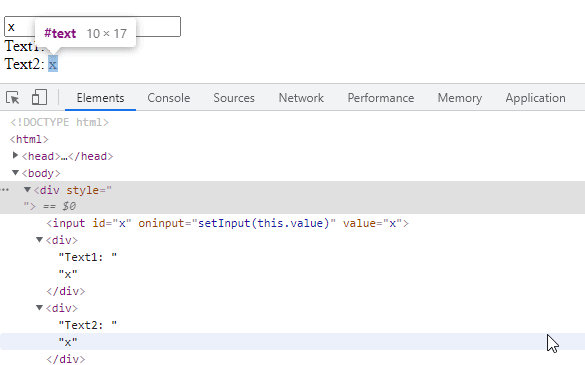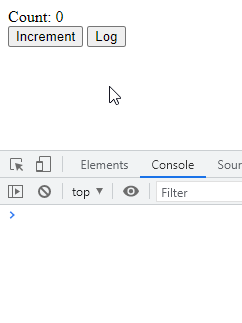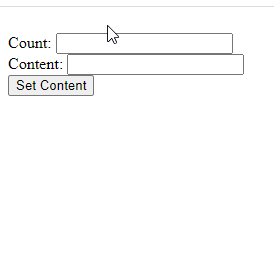htmlelementgenerator v1.2.6
This package is deprecated, latest version will be on stateful-html
htmlElementGenerator
Easy to use HTML generator with setter methods similar to React Hooks.
See Usage for details.
const bundle = htmlElementGenerator(
initializationObject,
htmlString,
contextObject
);Examples
Example1
htmlElementGenerator(
{},
`<div>
<input id="#{Input}" oninput="setInput(this.value)" value="#{Input}"/>
<div>Text1: #{Input}</div>
<div>Text2: #{Input}</div>
</div>`
);
Example2
htmlElementGenerator(
{
B1: 1,
B2: 2,
B3: 3,
},
`<div>
#{Text}
<button onmouseenter="setText(getB1())">#{B1}</button>
<button onmouseenter="setText(getB2())">#{B2}</button>
<button onmouseenter="setText(getB3())">#{B3}</button>
</div>`
);
Example3
htmlElementGenerator(
{ Count: 0 },
`<div>
<div>Count: #{Count}</div>
<button onClick="setCount(getCount()+1)">Increment</button>
<button onClick="console.log(getCount())">Log</button>
</div>`
);
Example4
htmlElementGenerator(
{},
`<div>
<div>Name: #{Name}</div>
<input oninput="setInputValue(this.value)" value="#{InputValue}" />
<button onClick="setName(getInputValue())">Set Name</button>
</div>`
);
Example5
function setArray(setArrFn, count, value) {
setArrFn({ Content: new Array(count).fill(value) });
}
htmlElementGenerator(
{},
`<div>
#[Arr][
<div>
<input oninput="setContent(this.value)" value="#{Content}"/>
<div>Content: #{Content}</div>
</div>
]
<br>
<div>Count: <input oninput="setCount(this.value)" value="#{Count}" /></div>
<div>Content: <input oninput="setInputValue(this.value)" value="#{InputValue}" /></div>
<button onclick="setArray(setArr,getCount(),getInputValue())">Set Content</button>
</div>`,
{ setArray }
);
Usage
import htmlElementGenerator from 'htmlelementgenerator';
/*
Returns created HTML element as element
with setter and getter methods for the tags you placed in the HTML with the #{} and #[][] format
*/
const {
// Destructure from returning object
element, // HTML element created from the string
setText1, // set #{Text1} as plain text
setLink1, // set #{Link1} as plain text
setTextHolder, // set #{TextHolder} as plain text
setArr, // set #[Arr] array
getText1, // get #{Text1} content as string
getLink1, // get #{Link1} content as string
getTextHolder, // get #{TextHolder} content as string
getArr, // get #[Arr] content as an object of arrays
} = htmlElementGenerator(
{
// Optional initializer list, if left out tags will be replaced by empty string('')
Text1: 'This is a span',
Link1: 'https://github.com',
TextHolder: 'textholder', // initialize #{TextHolder} as plain text
},
`
<div>
<span id="span1">#{Text1}</span>
#{TextHolder}
<div>
<a id="link1" href="#{Link1}">Link</a>
</div>
#[Arr][<p>#{Animal}-#{Count}</p>]
</div>
`
);After inserting the created element to the DOM, you can easily set the attributes you marked with setter methods. Or you can use automatic inline event bindings without destructuring setter methods from returning bundle object.
Setter and getter methods will be generated with the following format:
For the
#{Tag}there will be a setter method with the namesetTag().For the
#{Tag}there will be a getter method with the namegetTag().For the
#[Arr]array (from the example above) there will be a setter method with the namesetArr()with a parameter structure of
setArr([
{ Animal: 'cat', Count: 5 },
{ Animal: 'dog', Count: 2 },
]);OR
setArr({
Animal: ['cat', 'dog'],
Count: [5, 2],
});Both of the code above will render the html below:
<div>
<p>cat-5</p>
<p>dog-2</p>
</div>- For the
#[Arr](from the example above) there will be a getter method with the namegetArr()with a return structure of
{
Animal: ['cat', 'dog'],
Count: [5, 2]
}- Conditional rendering with array tags is lazy by default(already existing nodes will be updated not re-created) but you can force full re-render by passing second parameter true such as:
setArr(
{
Animal: ['cat', 'dog'],
Count: [5, 2],
},
true
);- To empty the array and remove all the elements from the dom call the setter method with no parameter, empty array or empty object
// All of these will empty the array
setArr();
setArr([]);
setArr({});Returns and Parameters
| bundle | initializationObject | htmlString | contextObject |
|---|---|---|---|
| Contains created element and dynamically generated helper methods | Optional initializer list for initializing tags placed in html string | Html string to create the element | For passing down functions that are not on global scope(mainly used for inline event bindings) |
| { element, setTag, getTag, setArr, getArr } | { Tag:'initial string' } | <div>#{Text}</div> | { outsideFn } |
Tag Types
| Regular Tag | Array Tag |
|---|---|
| #{TagName} | #TagName |
Regular Tag
You can mark positions for element attributes such as id, class, value etc.
Attributes can have only one Regular tag or not at all.
Attributes can have either a Regular tag or a constant not both.
You can mark positions for creating Text Nodes inside elements.
Example
htmlElementGenerator( {}, ` <div id=#{Id}> // Mark Attribute #{Text} // Mark Text Node </div> ` );Array Tag
You can mark positions anywhere except inside attributes for conditional rendering.
At this stage nested arrays are not supported.
Important: Arrays cannot be initialized with the initializationObject parameter, they need to be set with array setter methods after creation.
Example
const { element, setElements } = htmlElementGenerator(
{},
`
<div>
#[Elements][<div>#{Text}</div>]
</div>
`
);
document.body.appendChild(element);
setElements({ Text: ['text1', 'text2'] });
// This will render
<div>text1</div>
<div>text2</div>Automatic inline event binding
htmlElementGenerator automatically maps inline events with the generated setter methods if they match each other.
Important: As you know inline events will look to window object by default so if you have a function in a closure you can pass it in the third parameter context object with the name you want to access it inside the inline events.
See the example below:
(function () {
function outsideFn() {
// Do stuff
}
htmlElementGenerator(
{},
`<div>
<input id="#{Input}" oninput="setInput(this.value)" onclick="outsideFn()" value="#{Input}"/>
<div>Text1: #{Input}</div>
<div>Text2: #{Input}</div>
</div>`,
{ outsideFn }
);
})();With this example oninput has setInput(this.value) so htmlElementGenerator will automatically make the bindings so whenever input's oninput event is fired all the #{Input} tags will be set with the new value.
Automatic event binding is context aware and for Arrays it is self contained so you can use it easily inside Array Tags too. (See example below)
htmlElementGenerator(
{},
`<div>
<input oninput="setInput(this.value);" value="#{Input}"/>
#[Arr][
<div>
<input oninput="setInput(this.value)" value="#{Input}"/>
<div>#{Input}</div>
</div>
]
</div>`
);- With this example as you can see there are #{Input} tags in both #Arr tag and outside but they will not collide. Even though they do not collide, it is recommended not to use duplicate names.
Performance
Calling setter methods will only re-render the place of the tag that setter method is associated with. So this is not a plain text replacement tool that re-creates whole element every time you set a value. It only re-renders the place you want to set.
Demo
For demo click here, new demos will be added over time.
Tests
npm install
npm run test
New tests will be added over time.
For questions and feedbacks you can use issues or send me an email.